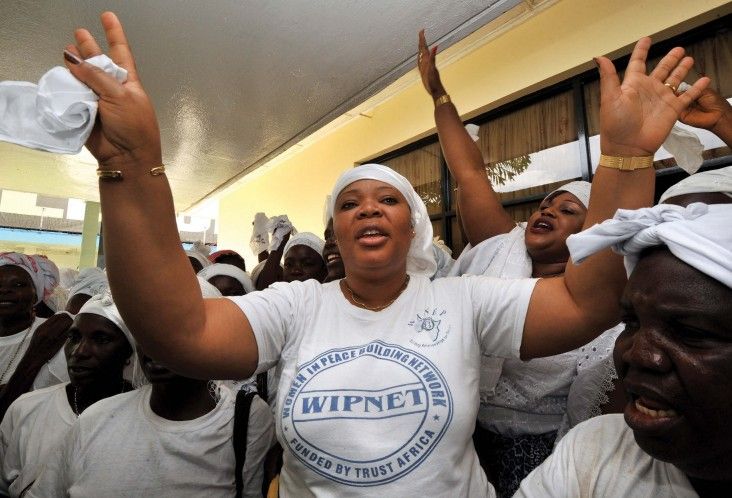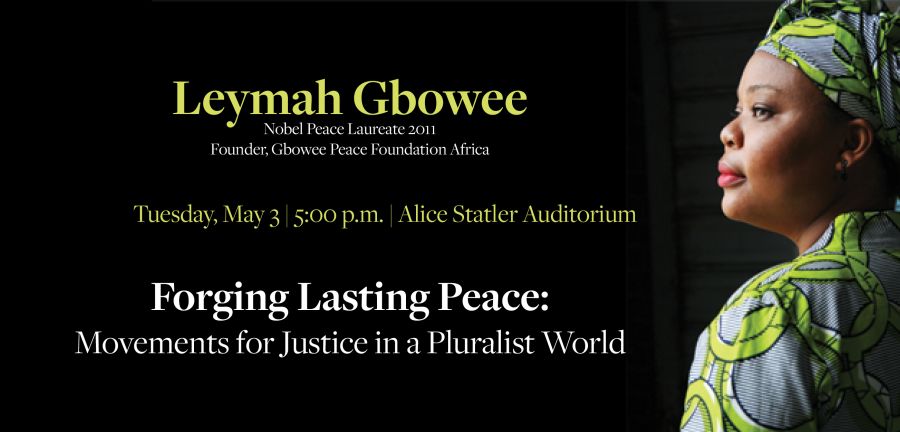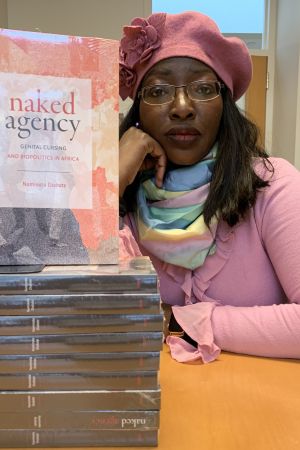Bartels Explainer

How did Leymah Gbowee's protests lead to lasting peace?
Naminata Diabate outlines the movement's tactics and explains how womens' protests helped end the Liberian civil war.
This year's Bartels lecturer, Nobel laureate Leymah Gbowee, led an interfaith women's peace movement that played a pivotal role in bringing warlords to the peace table and ultimately ending Liberia's bloody 14-year civil war in 2003. The movement's historic achievement earned Gbowee the Nobel Peace Prize in 2011. She continues her work as a global leader and activist for peace and women's rights.
"We need to specify that both a sex strike and the threat to strip naked are not nonviolent forms of protest."
On this page: Naminata Diabate describes the tactics used by Women of Liberia Mass Action for Peace, the interfaith women's peace movement Gbowee led, and explains how the protests helped end the civil war. Diabate is an associate professor of comparative literature in the College of Arts and Sciences and member of the Institute for African Development's faculty steering committee.
Coming May 3: Reserve Your Free Ticket Today!
A Conversation with Naminata Diabate
What types of protests did Gbowee and the peace movement she led carry out?
Leymah Gbowee and the interfaith women wrote countless letters to major stakeholders, organized vigils, fasting, meetings, deliberations, sit-ins, dancing and chanting, a sex strike—and finally threatened to strip naked. Most importantly, they deployed determination to bring peace to their country.
Were these nonviolent protests?
We need to specify that both a sex strike and the threat to strip naked are not nonviolent forms of protest. In fact, they constitute the most violent types that women in specific communities (such as the ones Leymah Gbowee and her comrades worked in) can deploy against their menfolk, and by extension, their societies.
A sex strike—which we see organized around the world and even in the United States—is not peaceful because it reverses the gender expectation of the female body as available for procreation, male sexuality, and pleasure, and relatedly, it opposes procreation, which can endanger the life of the community.
As for defiant self-exposure—another name I use for naked protest—it constitutes the last resort in specific circumstances that allegedly cause the targeted males a myriad of misfortunes, including shame, impotence, infertility, incurable diseases, and literal or social death.
What were the protesters trying to accomplish?
With multiple strategies, both violent and nonviolent, the women tried to attract the attention of the international community and force the warring parties and strongmen such as Charles Taylor to understand the suffering of the Liberian people—and to bank on the women’s unfailing determination to bring about peace.
How was this group of women able to succeed against strongmen like Taylor?
This grassroots group of women was able to succeed against the warring factions and strongmen thanks to their unwavering resolve to matter as peace brokers in their country’s journey through war and toward peace. Additionally, their resourcefulness in deploying multiple conflict management tactics—both modern and indigenous—to make a difference remains remarkable.
Why do you think their protests were effective?
The women’s protest tactics were effective because they refused to be muzzled. Their journey was strewn with violent counterattacks, including verbal abuse, humiliation, dismissal, physical brutality, and even death threats. Although they were at times weakened, these exceptional women always came back with more tactics to achieve visibility. The stakeholders, including Charles Taylor, could not but work with these women who refused to go away.
Don't miss the Bartels World Affairs Lecture with Leymah Gbowee on May 3: Reserve your free ticket today!


